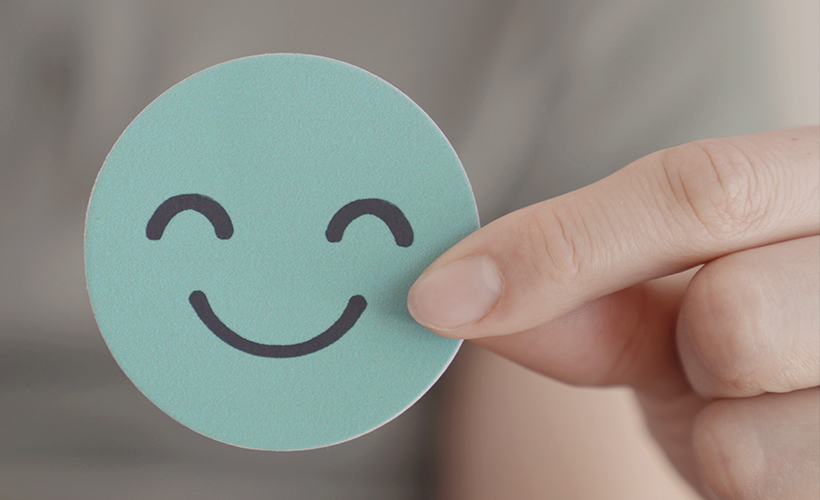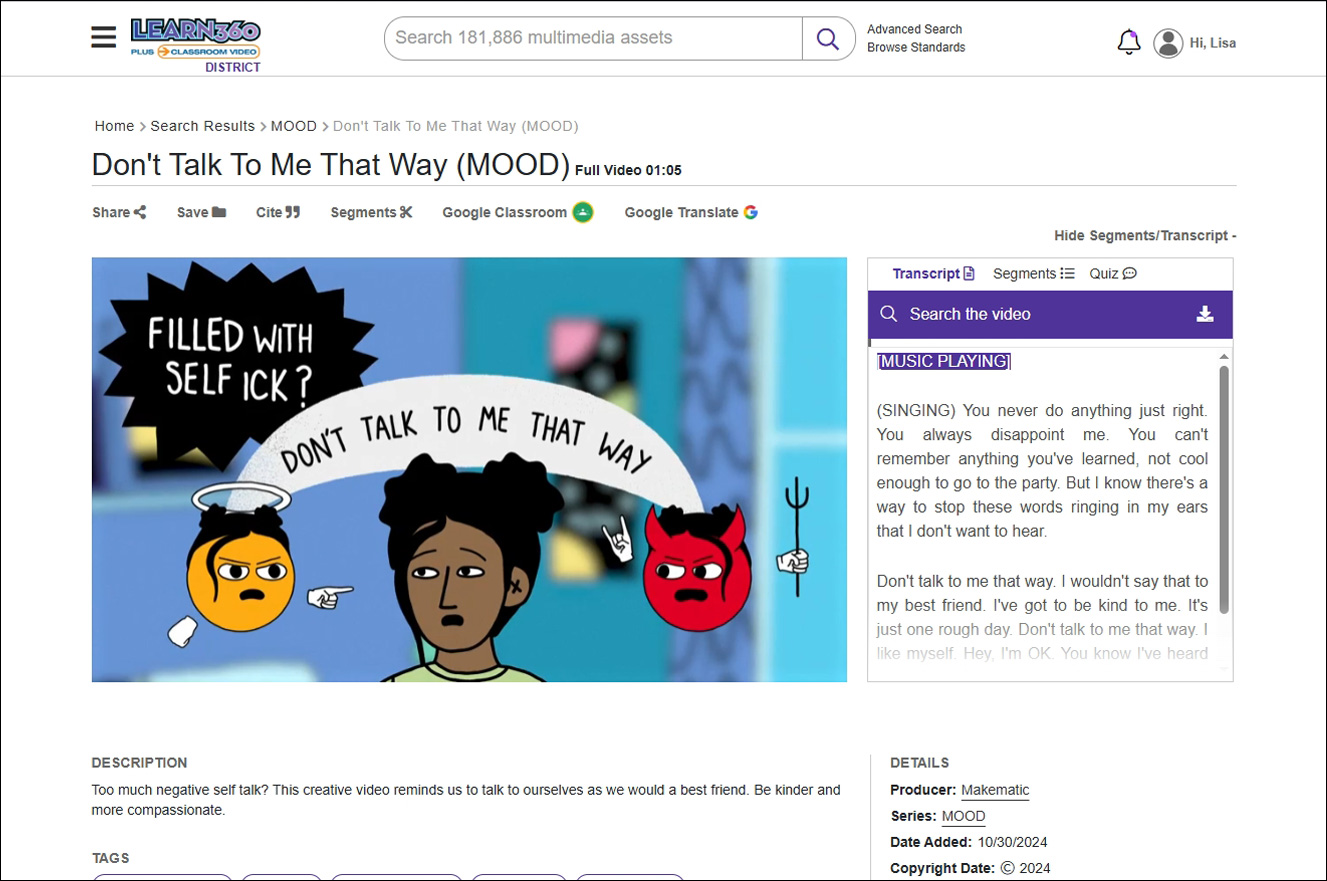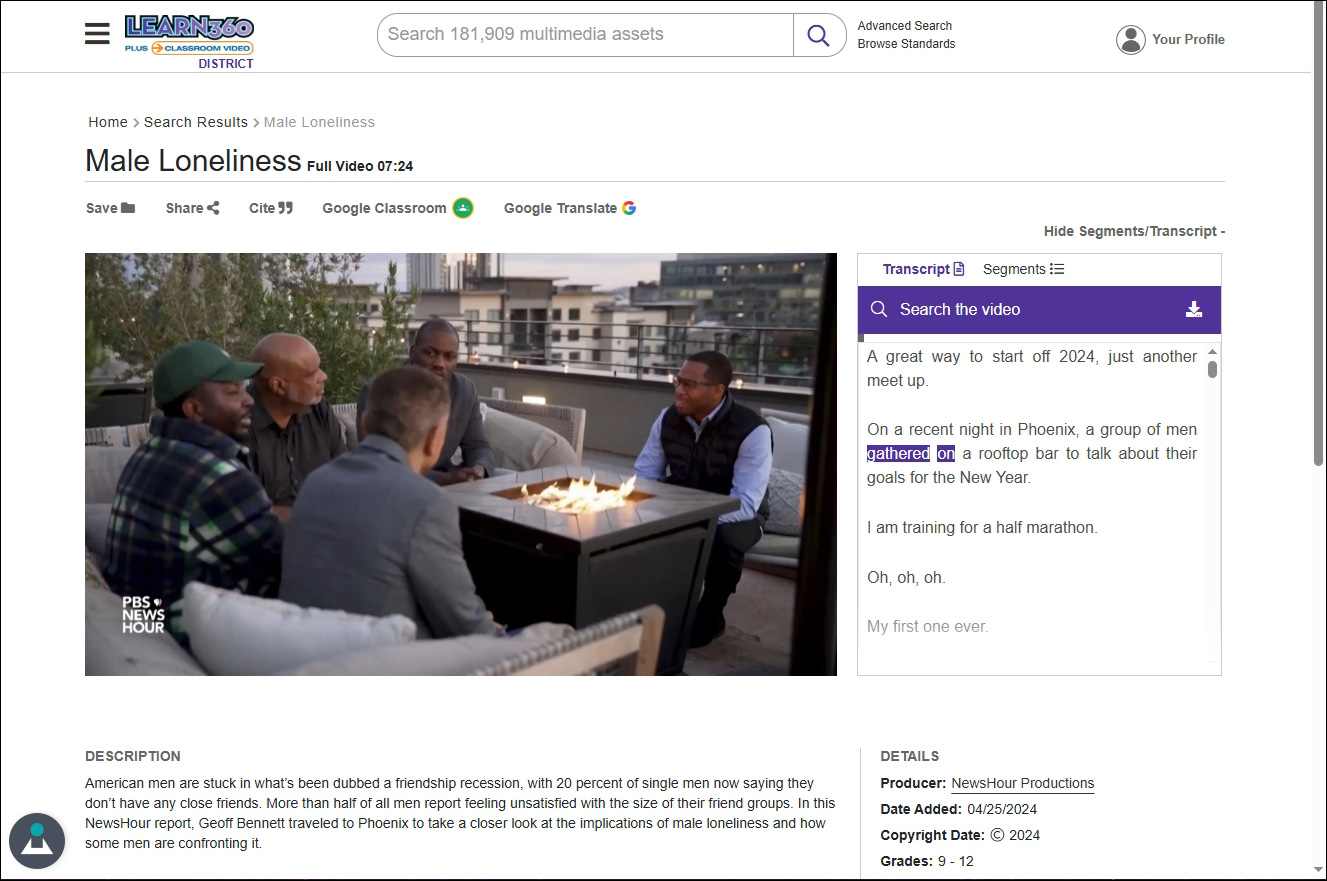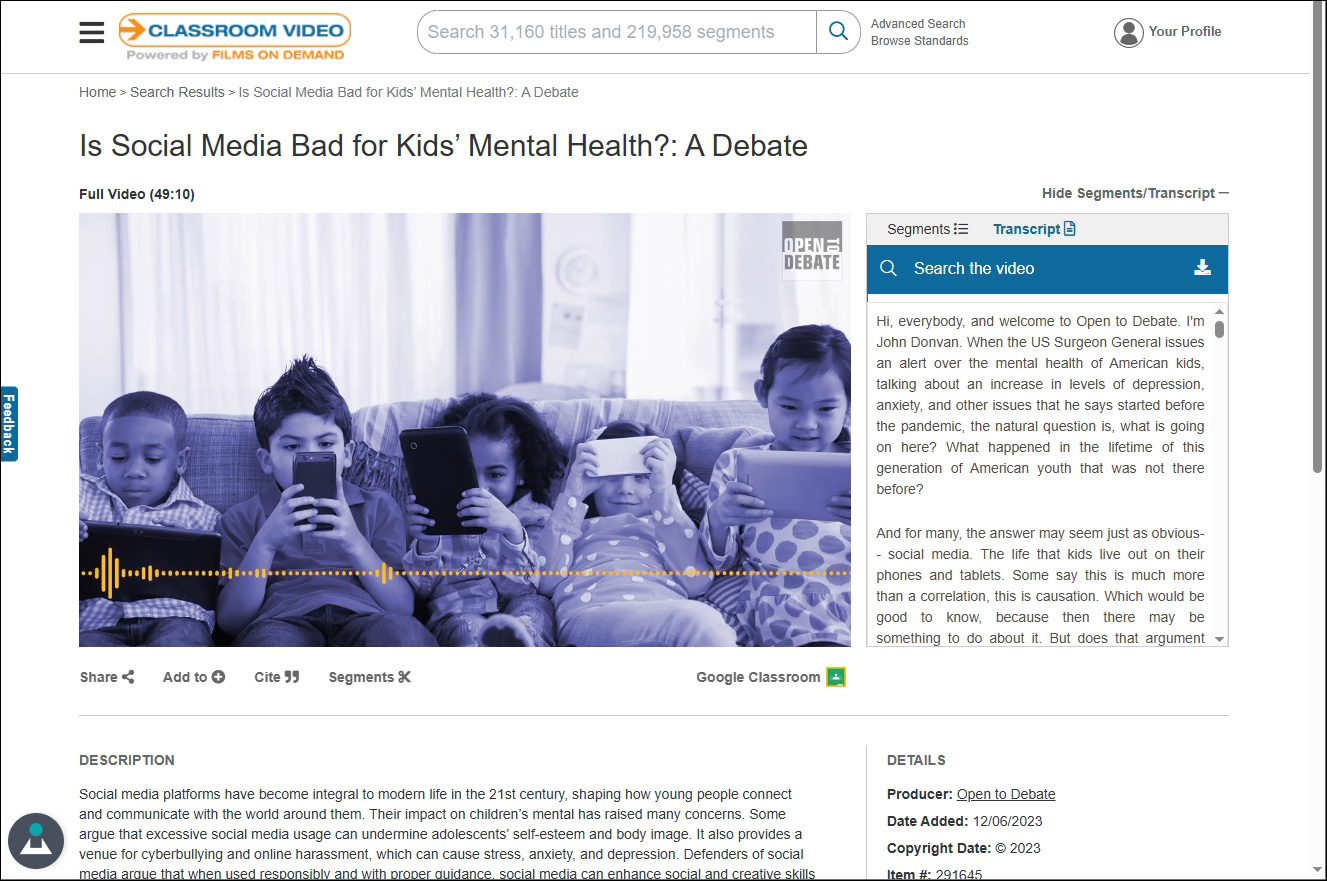While the benefits of maintaining one’s physical health are well documented and discussed, mental health is equally as important. And the two are heavily interlinked. Poor physical health can lead to poor mental health, and vice versa; for example, depression can increase the risk of physical health problems, including diabetes and heart disease. As such, for educators, encouraging students to maintain physically healthy lifestyles is important, but mental health and wellness should also be taken into consideration.
If you’re looking for videos on mental health to share with your students, explore the videos and more on the topic that you can find on Learn360 for K–12 schools and districts and Classroom Video On Demand for secondary schools.
Learn more about Classroom Video On Demand
Below, we highlight videos and series available through these products that you can use to spread awareness about mental illness and promote mental health, plus a Topic Center you can use to help elementary students manage their emotions. (Not all titles are available on both platforms or in all countries. Some of these titles contain mature themes or content; viewer discretion is advised. If you or someone you know is struggling with mental health issues, dial 988 for the Suicide and Crisis Lifeline or visit their website.)
Emotions and Belonging Topic Center
Learn360’s Emotions and Belonging Topic Center brings a variety of editorially curated videos, printables, and more for the classroom that are aligned to the CASEL framework. Help young students learn to manage their emotions, build character, and cultivate friendships with educational content such as:
- Videos including “Accept and Learn from Mistakes,” “Celebrate Strengths,” and “How Words Make People Feel” from Makematic’s Crayola Pilot Project series and “I Dig Being Kind” from Vooks
- Printables including “A Plan to De-stress” and “Day-by-Day Plans: Feelings” from The Mailbox
- Songs and audiobooks including “You Can Do It” from Highlights for Children and “Say Sorry!: Character Building Songs” from Jordan Music Productions

Moodies Series (Educational Voice Ltd., PreK–2)
Join Aaron and the Moodies as they work together to deal with life’s issues. This seven-part series covers topics like making decisions and facing challenges and encourages children to become a little more independent and resilient.
MOOD Series (Makematic, Grades 3–12)
Through vibrant character animations and relatable narratives, this 17-part series provides tweens with accessible animated tools that promote emotional well-being. These short, engaging videos will resonate with young audiences and encourage meaningful conversations about mental health.
I’m Fine, (Not) Really (Film Ideas, Grades 6–12)
This groundbreaking and powerful documentary looks at the unhealthy relationship between elite athletes and their fans and how the ever-growing demands and expectations they feel compelled to meet has contributed to the rising level of mental health issues in sports today.
Food and Mental Health (NewsHour Productions, Grades 6–12)
The food we eat affects us in many ways. A recent study from Massachusetts General Hospital and Harvard Medical School found a link between the consumption of ultra-processed foods and an increase in the risk of depression. In this NewsHour program, Ali Rogin speaks with Olivia Okereke, an associate professor of psychiatry at Harvard Medical School who worked on the study, to learn more.
Ken Burns Presents Hiding in Plain Sight: Youth Mental Illness (PBS, Grade 9–12)
Hiding in Plain Sight: Youth Mental Illness is a two-part, four-hour documentary that explores America’s mental health crisis through the eyes of more than 20 young people, their providers, advocates, family, and friends. The interviewees speak courageously about their challenges, difficulty finding treatment, and encounters with stigma—making their experiences more relatable for all of us.
Mysteries of Mental Illness Series (PBS, Grades 9–12)
In this four-part series, explore the evolution in understanding, and the dramatic attempts across generations, to unravel the difficult questions surrounding mental illness people have grappled with throughout history: What causes it? And how is it best treated?
Decolonizing Mental Health (PBS, Grades 9–12)
Decolonizing Mental Health dismantles the racism that underscores the mental healthcare industry. By focusing its gaze on the transformative work of therapists and individuals of color, it calls for a redressal of the ways in which we define psychiatric illness and health.
Male Loneliness (NewsHour Productions, Grades 9–12)
American men are stuck in what’s been dubbed a friendship recession, with 20 percent of single men now saying they don’t have any close friends. More than half of all men report feeling unsatisfied with the size of their friend groups. In this NewsHour report, Geoff Bennett traveled to Phoenix to take a closer look at the implications of male loneliness and how some men are confronting it.
Climate Anxiety (NewsHour Productions, Grades 9–12)
Millions of Americans are experiencing firsthand the effects of climate change, from triple-digit temperatures to wildfire smoke to bleached coral reefs in warming oceans. For some, growing concern about climate change can become an overwhelming sense of despair that psychologists call climate anxiety. Climate psychology therapist Leslie Davenport joins John Yang to discuss in this NewsHour report.
Is Social Media Bad for Kids’ Mental Health?: A Debate (Open to Debate, Grades 9–12)
Social media platforms have become integral to modern life in the 21st century, shaping how young people connect and communicate with the world around them. Their impact on children’s mental health has raised many concerns. Is social media bad for kids’ mental health? Watch scholars, journalists, and experts debate this issue.
#Happy: The Dictatorship of Happiness on Social Media (Java Films, Grades 9–12)
We spend hours on Facebook, Instagram, and Snapchat, seduced by their promise to be able to share our life and our opinions with the whole world. In this virtual world, everyone is happy. Everyone has perfect bodies and lives fulfilled lives in stylish houses surrounded by beautiful friends and family. Everyone shows off and everyone judges. But this irresistible quest for recognition can quickly turn into addiction, wreaking havoc on our mental health. And teenagers are the most susceptible. This program examines the real dangers of the “happycracy” promoted on social networks and hears from some of its young victims.
Facing Suicide (PBS, Grades 9–12)
Facing Suicide combines the poignant personal stories of people impacted by suicide with profiles of scientists at the forefront of research to reveal new insights into one of America’s most pressing mental health crises. Shining a light on this difficult topic can destigmatize suicide while revealing that there is help as well as hope for those at risk and their loved ones.
The Easy Guide to Mental Health (Channel 1 Creative Media, Grades 10–12)
In this training video, learn how to discuss mental health in the workplace, how to identify signs of mental health distress, and ways to communicate with someone who may need help.
Workplace Wellness Series (PowerSplash Project, Grades 10–12)
Stress is certainly prevalent in the workplace but employees are often afraid or ashamed to ask for help. Considering we spend a substantial amount of time at work, a company has an opportunity to offer assistance to these employees who are hurting, misguided, or addicted—basically, good people with a problem. The Workplace Wellness series provides an intimate look at issues handled by human resources. These sensitive topics are presented in ways that are compassionate and pro-recovery.
Subscribers, want to see this content for yourself? Log into Learn360 or Classroom Video On Demand today!
Not a subscriber? Take a FREE TRIAL.
See also:
- Artificial Intelligence (AI) Streaming Collection Now Available
- Help Students Learn Financial Literacy
- 10 Ideas to Celebrate School Library Month
- Master Information Literacy with Our New Video Series
- Content Conversations for Educators: Andrew Kaplan Discusses Walt Whitman
[Hero image source: SewCreamStudio/Shutterstock.com]






